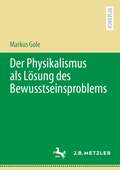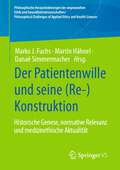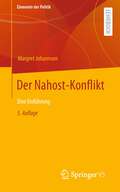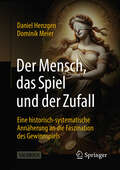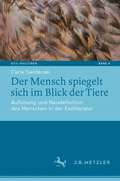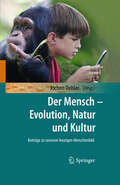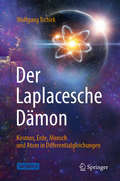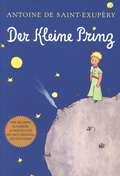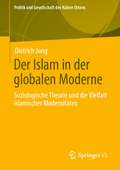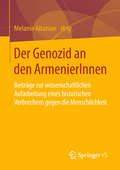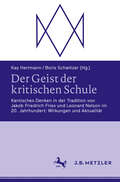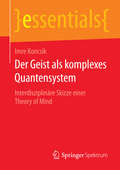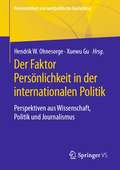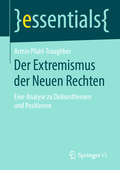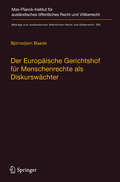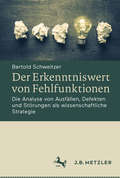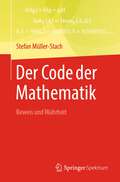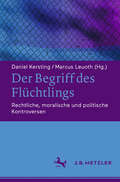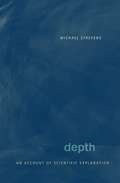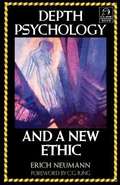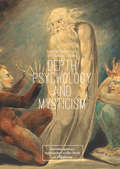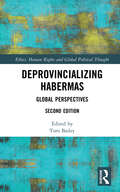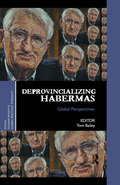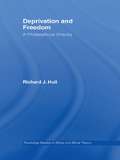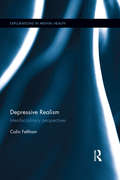- Table View
- List View
Der Physikalismus als Lösung des Bewusstseinsproblems
by Markus GoleWir wissen, wie es ist, Schmerzen zu haben, jemanden zu lieben oder Angst zu haben. Diese subjektiven Erlebnisqualitäten werden "Qualia" (Singular: Quale) genannt und die Frage nach deren Platz in einer objektiven, naturwissenschaftlich geprägten Welt stellt das Bewusstseinsproblem dar. Eine Lösung ist die These des Physikalismus, die behauptet, dass alles Existierende physikalisch sei. Das Ziel der vorliegenden Arbeit ist es, die These des Physikalismus zu explizieren und zu zeigen, dass die hier erarbeitete Version auch wahr ist. Schließlich wird durch ein neues Argument gezeigt, dass die Wahrheit des Physikalismus deduktiv aus dessen Prämissen folgt. Der Physikalismus setzt sich somit innerhalb der Philosophie des Geistes als die überzeugendste Lösung des Bewusstseinsproblems durch.
Der Patientenwille und seine: Historische Genese, normative Relevanz und medizinethische Aktualität (Philosophische Herausforderungen der angewandten Ethik und Gesundheitswissenschaften/ Philosophical Challenges of Applied Ethics and Health Sciences)
by Martin Hähnel Marko J. Fuchs Danaë SimmermacherDieser Band behandelt umfassend und systematisch die Frage des Patientenwillens: die historischen und philosophischen Grundlagen des Willensbegriffs, die Beziehung von Autonomie und Wille und praktische Fragen der Bioethik und des Biorechts.
Der Nahost-Konflikt: Eine Einführung (Elemente der Politik)
by Margret JohannsenDer Nahost-Konflikt ist ein Schlüsselelement der internationalen Beziehungen. In diesem Buch werden sowohl der Kern des Konflikts als auch die internationalen Dimensionen auf knappem Raum dargestellt.
Der Mensch, das Spiel und der Zufall: Eine historisch-systematische Annäherung an die Faszination des Gewinnspiels
by Dominik Meier Daniel HenzgenDas vorliegende Buch Der Mensch, das Spiel und der Zufall bietet eine historisch-systematische Analyse des Gewinnspiels und seines ewigen Reizes für uns Menschen. Aufbauend auf Erkenntnissen der Geschichtswissenschaft, Philosophie, Ökonomie, Statistik und Psychologie, ergründet es die Faszination des spielerischen Ringens mit dem Zufall – und warum Gewinnspiele seit jeher ein Kampfplatz von Ideologien, Moralvorstellungen, Lebenskonzeptionen und Machtinteressen sind. Der Band setzt einen Denkanstoß für jeden, der sich privat oder beruflich mit Gewinnspielen beschäftigt oder einfach von diesem weiten Feld fasziniert ist. Die Abhandlung bietet strategisches Orientierungswissen zur weiteren Meinungsbildung und versteht sich als Grundlagenwerk, das ein breites Publikum aus Wissenschaft, Wirtschaft, Gesellschaft und Politik zum Nachdenken anregen soll.
Der Mensch spiegelt sich im Blick der Tiere: Auflösung und Neudefinition des Menschen in der Exilliteratur (Exil-Kulturen #9)
by Carla SwiderskiWas ist der Mensch und wie verhält er sich zum Tier? Wird diese Frage in ethischen, gesellschaftlichen, philosophischen und ästhetischen Diskursen seit der Antike debattiert, stellt sie sich im 20. Jahrhundert angesichts der NS-Diktatur und ihrer Verbrechen gegen die Menschlichkeit in einem besonders bedrohlichen Umfeld. Wie wirkt sich dies auf das nachfolgende Verständnis von Mensch und Tier aus? – Die vorliegende Arbeit untersucht Mensch-Tier-Konstellationen in fiktionalen und theoretischen Texten, die im durch das NS-Regime verursachten Exil entstanden sind. Dabei werden Fragen der Exilforschung mit Fragen der Literary und Cultural Animal Studies zusammengedacht. Ausführlich analysiert werden Texte von Victor Klemperer, Alexander Bein, Hannah Arendt, Max Horkheimer und Theodor W. Adorno, Hermann Broch, Oskar Maria Graf, Alfred Kerr, Hilde Domin und Hans Sahl.
Der Mensch - Evolution, Natur und Kultur
by Jochen OehlerGut 150 Jahren sind vergangen, seit Darwin sein Werk "Die Entstehung der Arten" geschrieben hat. Das Evolutionsparadigma hat inzwischen als erfolgreicher Forschungsansatz dazu beigetragen, u. a. psychologische, soziale, ethische, ästhetische oder auch politische Fragen zu klären. Namhafte Natur- und Geisteswissenschaftler zeigen in dem Band die Möglichkeiten evolutionärer Erklärungen und Vorhersagen auf. Durch die interdisziplinäre Herangehensweise ergibt sich ein ganzheitliches Bild der Herkunft und der Daseinsweise des Menschen aus heutiger Sicht.
Der Laplacesche Dämon: Kosmos, Erde, Mensch und Atom in Differentialgleichungen
by Wolfgang TschirkDieses Buch nimmt Sie mit auf eine spannende Reise durch die Welt der Wissenschaft: von den Fallgesetzen des Galilei bis zu Einsteins Gravitationswellen, von Newtons Axiomen bis zum Wasserstoffatom, von der natürlichen Auslese bis zum Schwarmverhalten, von der Skala der Empfindungen bis zu den Grenzen des Wachstums auf unserem Planeten. Sie lernen Differentialgleichungen als mächtiges Instrument kennen, das die Mathematik zur Erforschung der Natur bereitstellt. Ihre Lösungen enthüllen, um mit Laplace zu sprechen, die Bewegungen der größten Weltkörper und des kleinsten Atoms und vieles von dem, was dazwischen liegt – einschließlich unserer selbst. Lassen Sie sich von Wolfgang Tschirk begeistern: Er gewährt Ihnen einen unterhaltsamen Blick auf die Verstandesleistungen jener, die dem Laplaceschen Dämon Stück für Stück sein Geheimnis ablauschen. Um Macht und Schönheit der Differentialgleichungen zu erleben, sollten Sie Affinität zur Mathematik mitbringen und auch vor Formeln nicht zurückschrecken. Aber Sie werden sehen: Entgegen ihrem Ruf sind Differentialgleichungen im Grunde leicht zu verstehen und oft sogar leicht zu lösen.
Der Kleine Prinz
by Antoine de Saint-Exupéry Grete Leitgeb Josef LeitgebA beautiful German language edition of the internationally beloved classic In 2000 Harcourt proudly reissued Antoine de Saint-Exupéry's masterpiece, The Little Prince, in a new edition with vibrantly restored artwork and a fresh translation by Pulitzer Prize-winning poet Richard Howard. As critics and readers across the country embraced this timeless tale for its purity and beauty of expression, Harcourt released uniform full-color foreign language editions for readers of all ages and nationalities to rediscover and cherish.
Der Islam in der globalen Moderne: Soziologische Theorie und die Vielfalt islamischer Modernitäten (Politik und Gesellschaft des Nahen Ostens)
by Dietrich JungDieses Buch vereint soziologische Theoriebildung mit Studien zum Nahen Osten und zum Islam. Die Vielfalt von Modernitäten, die in unsere Welt beobachtet werden kann, wird dabei mit dem Anspruch verbunden, gleichzeitig in einer globalen Moderne, in einer Weltgesellschaft zu leben. Das Buch untermauert diesen Anspruch mit zahlreichen Exkursen in die islamische Geschichte. Es kritisiert die Auffassung, dass Modernisierung mit Verwestlichung gleichzusetzen wäre und betrachtet unterschiedliche Projekte von spezifisch islamischen Modernitäten als integrale Teile der Weltgesellschaft. Aus dieser Perspektive leistet die Studie einen Beitrag zur „Provinzialisierung“ der europäischen Geschichte im zeitgenössischen sozialwissenschaftlichen Denken. Entgegen den mit der Aufforderung zur Provinzialisierung Europas verbundenen Theorien des Postkolonialismus hält dieses Buch aber an wesentlichen Traditionen der klassischen Soziologie fest. Es will damit einen Beitrag zur sozialtheoretischen Diskussion um die Moderne leisten, der empirisch mit Hilfe von Daten aus der Geschichte des Nahen Ostens und des Islams untermauert wird.
Der Genozid an den ArmenierInnen: Beiträge zur wissenschaftlichen Aufarbeitung eines historischen Verbrechens gegen die Menschlichkeit
by Melanie AltanianDieser inter- und multidisziplinäre Band bietet einen Querschnitt durch die wissenschaftliche Auseinandersetzung mit dem über hundert Jahre zurückliegenden Armenier-Genozid, der bis heute von den türkischen Nachfolgeregierungen offiziell geleugnet wird. Beiträge aus unterschiedlichen Disziplinen weisen auf spezifische Probleme hin, die mit der Aufarbeitung dieses Genozids zusammenhängen: Beginnend mit einem (rechts-)historischen Teil über das Verbrechen sowie dessen zeitgenössische Bewertung, hin zu den direkten und indirekten psychologischen Folgen des Verbrechens bis heute, sowie moralphilosophische und rechtliche Fragestellungen in Bezug auf die Leugnung des Genozids.
Der Geist der kritischen Schule: Kantisches Denken in der Tradition von Jakob Friedrich Fries und Leonard Nelson im 20. Jahrhundert: Wirkungen und Aktualität
by Kay Herrmann Boris SchwitzerPhilosophie als Wissenschaft, als Grundlagendisziplin und als interdisziplinäre Forschung: Ansätze, die sich eine zu Unrecht fast vergessene philosophische Schule zu eigen gemacht hat, nämlich die 1903 neu gegründete Fries’sche Schule um den Göttinger Philosophen Leonard Nelson (1882-1927). Sie steht in der Tradition der Philosophie Immanuel Kants (1724-1804) und Jakob Friedrich Fries' (1773-1843). Der Nelsonkreis hält dem Vergleich mit dem Wiener Kreis stand. Die Anhänger des Nelsonkreises kamen u.a. aus der Mathematik, Physik, Philosophie, Psychologie, Theologie und den Sozial- und Wirtschaftswissenschaften. Über sie wirkte die kantisch-friessche Philosophie teilweise in andere Disziplinen hinein. Zu nennen sind beispielsweise der Psychiater und Psychologe Arthur Kronfeld (1846-1941), der Biochemiker und Nobelpreisträger Otto Meyerhof (1884-1951), der Mathematiker Gerhard Hessenberg (1874-1925), die Philosophin und Physikerin Grete Henry-Hermann (1901-1984), die Pädagogin MinnaSpecht (1879-1961), der Wirtschaftswissenschaftler Alexander Rüstow (1885-1963), der Theologe Rudolf Otto (1869-1937), der Soziologe Franz Oppenheimer (1864-1943) und der Sozialwissenschaftler Gerhard Weisser (1898-1989).Die Ausstrahlung des Nelsonkreises auf verschiedene Disziplinen sowie dessen Geschichte sind bislang noch nicht umfassend untersucht worden. Diese Forschungslücke soll mit dem vorliegenden Band geschlossen werden. Der systematische Forschungsband bietet zudem eine Einführung und einen Überblick zur Philosophie Leonard Nelsons.
Der Geist als komplexes Quantensystem: Interdisziplinäre Skizze einer Theory of Mind (essentials)
by Imre KoncsikImre Koncsik beschreibt die Theorie des Geistes als naturphilosophische Theorie auf Basis der Physik. Er identifiziert signifikante Parallelen zwischen Geist und Gehirn, die beide durch Elemente der Quantentheorie und der komplexen Systemtheorie beschrieben werden können. Beide Theorien beziehen sich auf eine immaterielle, formale und imaginäre Schicht der Realität. Sie ermöglichen eine innovative Beschreibung der morphologischen Strukturen und dynamischen Aktivitätsmuster des Gehirns in Analogie zu Mustern des Geistes. Eine Theorie des Geistes bildet hinsichtlich ihrer technologischen Applikation den Grundstein einer neuen, im eigentlichen Sinn ,,intelligenten" Technologie: der quantenbasierten Systemtechnologie.
Der Faktor Persönlichkeit in der internationalen Politik: Perspektiven aus Wissenschaft, Politik und Journalismus (Persönlichkeit und weltpolitische Gestaltung)
by Xuewu Gu Hendrik W. OhnesorgeDer Sammelband bildet den Auftakt der Schriftenreihe „Persönlichkeit und weltpolitische Gestaltung“, die von den Herausgebern begründet wurde. Er vereint Beiträge von Autorinnen und Autoren aus Wissenschaft, Politik und Journalismus, die sich der Frage nach der Rolle von Persönlichkeiten in internationaler Politik und Geschichte widmen. Der Band liefert einen Einstieg in das Forschungsfeld „Persönlichkeit und Politik“. Er kombiniert konzeptionelle Beiträge hinsichtlich der Einflussmöglichkeiten Einzelner mit empirischen Untersuchungen ausgewählter Persönlichkeiten aus Vergangenheit und Gegenwart. Dabei werden sowohl Perspektiven unterschiedlicher wissenschaftlicher Disziplinen als auch Erfahrungsberichte aus der Praxis sowie journalistische Beobachtungen einbezogen. In seiner Gesamtschau möchte der Band somit gleichermaßen den derzeitigen Stand der personenbezogenen Politikforschung pointiert darstellen wie auch eine Agenda für das Forschungsfeld entwickeln.
Der Extremismus der Neuen Rechten: Eine Analyse zu Diskursthemen und Positionen (essentials)
by Armin Pfahl-TraughberDieses essential behandelt die Neue Rechte, eine lose Gruppe von Intellektuellen, die sich auf die Konservative Revolution der Weimarer Republik berufen und durch eine „Kulturrevolution von rechts“ eine „Umwälzung“ vorantreiben wollen. Dabei liefert der Autor zunächst einige Basisinformation zur Definition, zu den politischen Klassikern, aber auch zu Organisation und Strategie. Dem folgt eine Fallstudie, die sich auf das „Institut für Staatspolitik“ und deren Zeitschrift „Sezession“ bezieht. Es werden Diskurse analysiert und deren Extremismusgehalt bewertet. Abschließend gibt es eine Einschätzung hinsichtlich des Stellenwertes, welchen die gemeinten Intellektuellen im Kontext des gegenwärtigen „Rechtsrucks“ einnehmen.
Der Europäische Gerichtshof für Menschenrechte als Diskurswächter: Zur Methodik, Legitimität und Rolle des Gerichtshofs im demokratisch-rechtsstaatlichen Entscheidungsprozess (Beiträge zum ausländischen öffentlichen Recht und Völkerrecht #263)
by Björnstjern BaadeDas Buch nimmt die aktuelle Kritik am EGMR zum Anlass, die Grundsatzfrage zu stellen, welche Rolle dieser gegenüber dem demokratisch-rechtsstaatlichen Entscheidungsprozess seiner Vertragsstaaten einnehmen sollte. Denn die Kritik an der Legitimität des Gerichtshofs, die momentan im Vereinigten Königreich am drastischsten formuliert wird, wirft berechtigte demokratietheoretische Frage auf und ist ernst zu nehmen. Neben einer detaillierten rechtstheoretischen und -methodischen Bewertung der Rechtsprechung wird die Kritik auch aus staatstheoretischer Sicht behandelt. Hierbei werden jeweils interdisziplinär Erkenntnisse der Philosophie sowie der Sprach- und Politikwissenschaften herangezogen. Nach einer ausführlichen Analyse anhand der Wiener Vertragsrechtskonvention werden objektivistische Auslegungsansätze (wie original meaning oder positivisme sociologique) erörtert und zurückgewiesen. Die Kontrolle der Einhaltung prä-existenter Normen ist als alleiniges Erklärungs- und Rechtfertigungsmodell jedenfalls defizitär. Aufgabe des Gerichtshofs ist es auch, den demokratisch-rechtsstaatlichen Entscheidungsdiskurs an seine korrekte Funktionsweise zu binden, seine normative Rationalität sicherzustellen sowie hierfür die Tatsachengrundlage zu prüfen. Hierbei kommt der margin of appreciation und dem sie maßgeblich bestimmenden Faktor der Legitimität der kontrollierten Entscheidung besondere Bedeutung zu. Sie verhindert ihrerseits, dass der Gerichtshof aus seiner Rolle fällt, die darin besteht, als Wächter dieses Diskurses einen Beitrag dazu zu leisten, dass die Institutionen demokratischer Rechtsstaaten ihrer Rolle entsprechen.
Der Erkenntniswert von Fehlfunktionen: Die Analyse von Ausfällen, Defekten und Störungen als wissenschaftliche Strategie
by Bertold SchweitzerDiese philosophische, interdisziplinäre Studie untersucht, auf welche Weise Fehlfunktionen einen einzigartigen Zugang zu Daten für Entdeckung und Prüfung von Theorien in vielen Wissenschaften bieten. Anhand von Beispielen aus Biologie, Evolution, Linguistik, Kognitionswissenschaft und anderen arbeitet sie die Funktionsweise wissenschaftlicher Methoden heraus, die versuchen, aus der Analyse von Fehlfunktionen Erkenntnisse über normale Struktur und Funktion zu gewinnen. Sie identifiziert die allgemeinen Merkmale, Ziele und Ergebnisse der Methoden (zum Beispiel Zerlegung, Sequenzierung und Lokalisierung von Subsystemen) und untersucht ihre Beziehungen zu konventionellen Strategien der Entdeckung und des Testens, etwa kausale und mechanistische Analyseverfahren.
Der Code der Mathematik: Beweis und Wahrheit
by Stefan Müller-StachMotiviert durch aktuelle Entwicklungen in der abhängigen Typentheorie und bei Unendlichkategorien präsentiert dieses Buch die Ideengeschichte der Begriffe Wahrheit, Beweis, Gleichheit und Äquivalenz. Neben ausgewählten Ideen von Platon, Aristoteles, Leibniz, Kant, Frege und anderen werden Resultate von Gödel und Tarski über Unvollständigkeit, Unentscheidbarkeit und Wahrheit in deduktiven Systemen und ihren semantischen Modellen vorgestellt. Der Hauptgegenstand dieses Textes ist die abhängige Typentheorie und neuere Entwicklungen in der Homotopy Type Theory. Diese Theorien beinhalten Identitätstypen, die neue Möglichkeiten für Gleichheit, Symmetrie, Äquivalenz und Isomorphie auf konzeptuelle Weise eröffnen. Die Interaktion von Typentheorie und Unendlichkategorien ist ein neues Paradigma für eine strukturelle Sichtweise auf die Mathematik. Sie fördert auch den neuen Trend zur Formalisierung von Mathematik in Form von Beweisassistenten.
Der Begriff des Flüchtlings: Rechtliche, moralische und politische Kontroversen
by Daniel Kersting Marcus LeuothSeit Jahren wird wieder aufgeregt über Flüchtlinge diskutiert – über offene und geschlossene Grenzen, berechtigte und unberechtigte Asylansprüche, über Aufnahme und Abschiebung. Welche Rechte Geflüchtete haben und welche Pflichten ihnen gegenüber bestehen, ist umkämpft. Der Band analysiert zentrale Probleme dieser moralischen, rechtlichen und politischen Debatten und der sozialen Praktiken des Umgangs mit Geflüchteten. Zugleich führt er in Grundbegriffe der aktuellen Flucht- und Flüchtlingsforschung ein und stellt dafür den Begriff des Flüchtlings selbst in den Fokus der interdisziplinären Untersuchung.
Depth: An Account of Scientific Explanation
by Michael StrevensWhat does it mean for scientists to truly understand, rather than to merely describe, how the world works? Michael Strevens proposes a novel theory of scientific explanation and understanding that overhauls and augments the familiar causal approach to explanation. What is replaced is the test for explanatorily relevant causal information: Strevens discards the usual criterion of counterfactual dependence in favor of a criterion that turns on a process of progressive abstraction away from a fully detailed, physical causal story. The augmentations include the introduction of a new, non-causal explanatory relevance relationâe"entanglementâe"and an independent theory of the role of black-boxing and functional specification in explanation. The abstraction-centered notion of difference-making leads to a rich causal treatment of many aspects of explanation that have been either ignored or handled inadequately by earlier causal approaches, including the explanation of laws and other regularities, with particular attention to the explanation of physically contingent high-level laws, idealization in explanation, and probabilistic explanation in deterministic systems, as in statistical physics, evolutionary biology, and medicine. The result is an account of explanation that has especially significant consequences for the higher-level sciences: biology, psychology, economics, and other social sciences.
Depth Psychology and a New Ethic
by C. G. Jung Gerhard Adler Erich Neumann James Yandell Micha NeumannThe modern world has witnessed a dramatic breakthrough of the dark, negative forces of human nature. The "old ethic," which pursued an illusory perfection by repressing the dark side, has lost its power to deal with contemporary problems. Erich Neumann was convinced that the deadliest peril now confronting humanity lay in the "scapegoat" psychology associated with the old ethic. We are in the grip of this psychology when we project our own dark shadow onto an individual or group identified as our "enemy," failing to see it in ourselves. The only effective alternative to this dangerous shadow projection is shadow recognition, acknowledgement, and integration into the totality of the self. Wholeness, not perfection, is the goal of the new ethic.
Depth Psychology and Mysticism (Interdisciplinary Approaches to the Study of Mysticism)
by Thomas Cattoi David M. OdorisioSince the late 19th century, when the “new science” of psychology and interest in esoteric and occult phenomena converged – leading to the “discovery” of the unconscious – the dual disciplines of depth psychology and mysticism have been wed in an often unholy union. Continuing in this tradition, and the challenges it carries, this volume includes a variety of inter-disciplinary approaches to the study of depth psychology, mysticism, and mystical experience, spanning the fields of theology, religious studies, and the psychology of religion. Chapters include inquiries into the nature of self and consciousness, questions regarding the status and limits of mysticism and mystical phenomenon, and approaches to these topics from multiple depth psychological traditions.
Deprovincializing Habermas: Global Perspectives (Ethics, Human Rights and Global Political Thought)
by Tom BaileyThis book provides a rich and systematic engagement with Jürgen Habermas’ political theory from critical perspectives outside its Western locus. It constructively examines the theory’s implications for non-‘Western’ contexts ranging from Latin America and the Middle East to India and China, and for themes ranging from cosmopolitanism, democracy and human rights to colonialism, feminism, care, modernity, and religion. The chapters added to the second edition explore Habermas’ own recent response to the charge of ‘provincialism’. The book will be of special interest to scholars and students of political theory, global justice, international affairs, philosophy, and critical theory, and also to those working in postcolonial studies, religious studies, sociology and cultural studies.
Deprovincializing Habermas: Global Perspectives (Ethics, Human Rights and Global Political Thought)
by Tom BaileyThis volume engages with Jürgen Habermas’s political theory from critical perspectives beyond its Western European origins. In particular, it explores the challenges of democratizing, decolonizing and desecularizing his theory for global contexts, and proposes ‘deprovincializing’ reformulations for contemporary political and social issues.
Deprivation and Freedom: A Philosophical Enquiry (Routledge Studies in Ethics and Moral Theory)
by Richard HullDeprivation and Freedom investigates the key issue of social deprivation. It looks at how serious that issue is, what we should do about it and how we might motivate people to respond to it. It covers core areas in moral and political philosophy in new and interesting ways, presents the topical example of disability as a form of social deprivation, shows that we are not doing nearly enough for certain sections of our communities and encourages that we think differently about how we should best organise our societies in the future. The book develops a comprehensive yet refreshingly simple account of human freedom, which shows how the ability to realise our freedom is partly definitive of freedom itself. That account conclusively illustrates how many deprivations represent remediable inequalities of important and very basic human freedoms, posing the question as to why societies continue to do so little about them. In answering that question, Hull shows how the idea of social exclusion is misleading and, instead, tackles the far more pertinent and challenging issue of societies' failure to include. The moral seriousness of non-inclusion, the failure to provide for freedom, is evaluated via critical discussion of a variety of central themes and distinctions in ethical and political theory. The author shows how such themes and distinctions comprise a framework for evaluating a raft of social issues, in turn providing a unique resource for students of moral, political and applied philosophy. The book concludes with an innovative, challenging and effective combination of analytic and continental styles, so to address the critical question of how we might actually motivate constructive social change. In doing so, it shows how a variety of approaches can work successfully together to provide an emphatic case for greater social inclusion. Deprivation and Freedom shows how even fairly modest claims about social provision illustrate that we should be doing a lot more about social deprivation than we are now. It should be of interest to anyone who is concerned with questions about the type of society in which they live, what it says about us to continue as we are - and how we might motivate realistically achievable social change.
Depressive Realism: Interdisciplinary perspectives (Explorations in Mental Health)
by Colin FelthamDepressive Realism argues that people with mild-to-moderate depression have a more accurate perception of reality than non-depressives. Depressive realism is a worldview of human existence that is essentially negative, and which challenges assumptions about the value of life and the institutions claiming to answer life’s problems. Drawing from central observations from various disciplines, this book argues that a radical honesty about human suffering might initiate wholly new ways of thinking, in everyday life and in clinical practice for mental health, as well as in academia. Divided into sections that reflect depressive realism as a worldview spanning all academic disciplines, chapters provide examples from psychology, psychotherapy, philosophy and more to suggest ways in which depressive realism can critique each discipline and academia overall. This book challenges the tacit hegemony of contemporary positive thinking, as well as the standard assumption in cognitive behavioural therapy that depressed individuals must have cognitive distortions. It also appeals to the utility of depressive realism for its insights, its pursuit of truth, as well its emphasis on the importance of learning from negativity and failure. Arguments against depressive realism are also explored. This book makes an important contribution to our understanding of depressive realism within an interdisciplinary context. It will be of key interest to academics, researchers and postgraduates in the fields of psychology, mental health, psychotherapy, history and philosophy. It will also be of great interest to psychologists, psychotherapists and counsellors.
